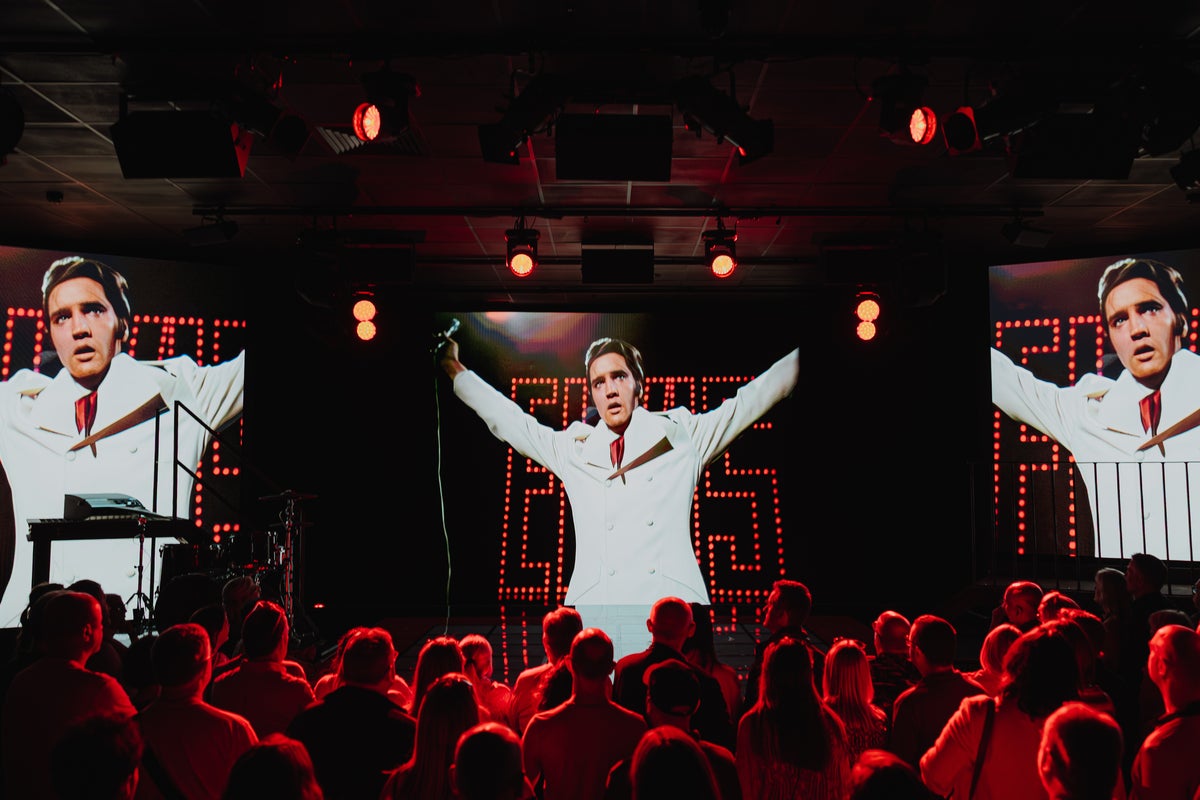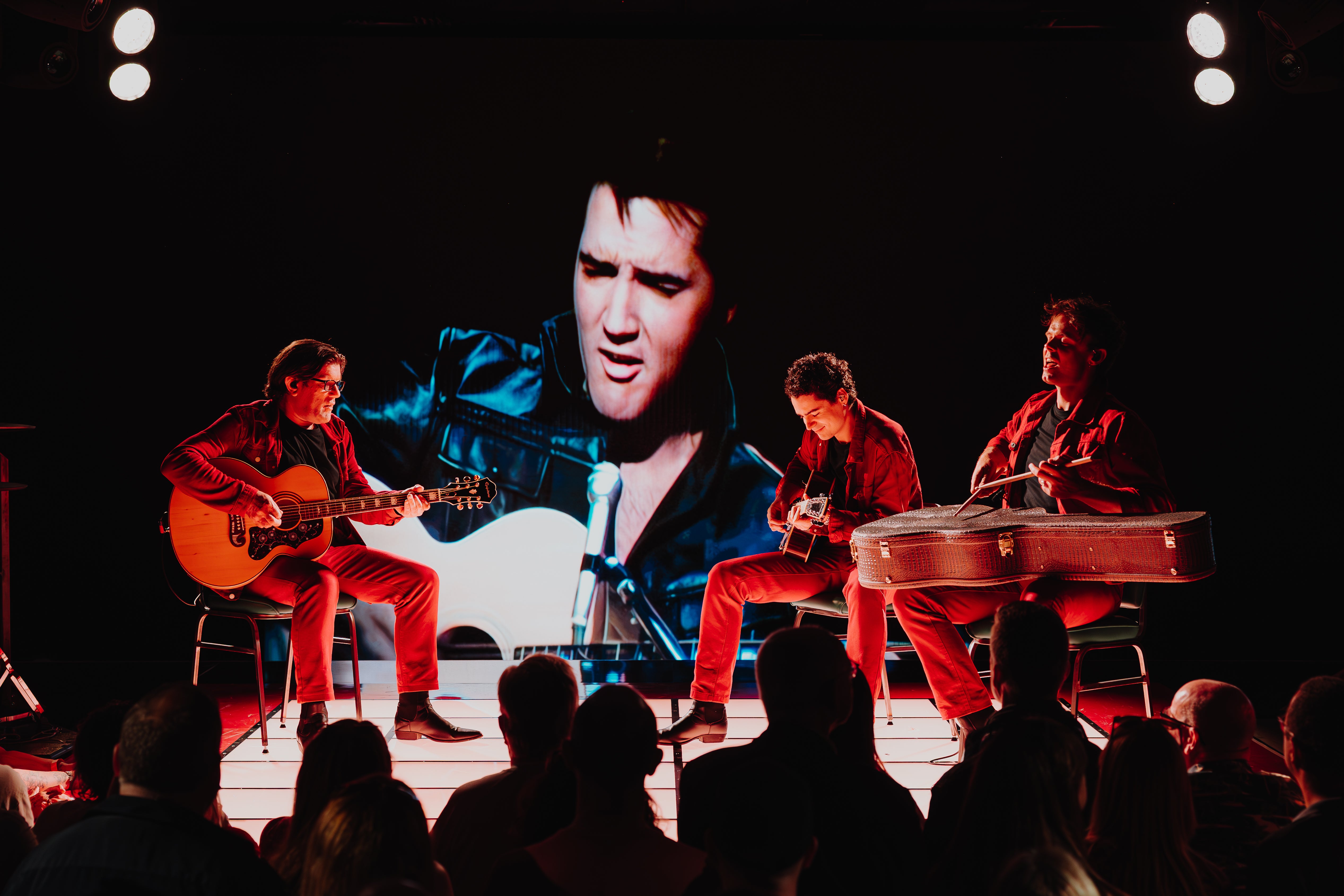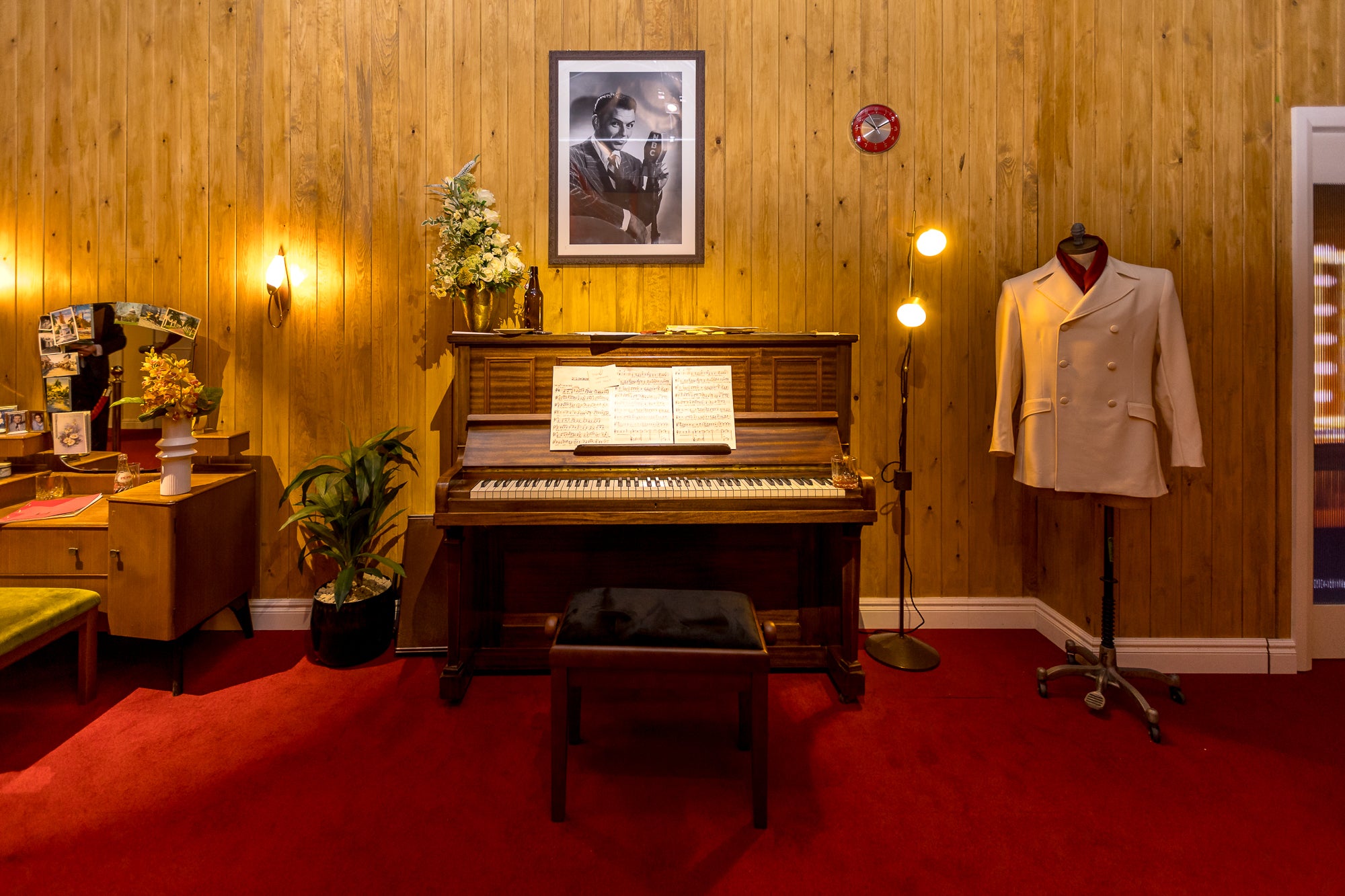
Elvis has left the building… and set up shop in east London. Rock’n’roll’s gold-lamé King may have died, tragically, in 1977, but this week his hip-swivelling, leg-shaking likeness returned to the spotlight at Elvis Evolution, a newly opened “immersive experience”. The show would see Elvis Presley reincarnated in millions of pixels, restoring the Memphis musician to his former glory. At the cost of between £75 and £300, people would, organisers promised, “experience Elvis like never before”.
Things haven’t quite panned out like that. Elvis Evolution opened last week after an eight-month delay, and the reception has been radioactive. Reports of walkouts, heckling and “noticeable booing” have surfaced, with demands for refunds and cancellations flooding in. Memes are circulating online mocking the production – the bellwether of any public fiasco – calling to mind Glasgow’s infamous “Willy Wonka Experience”, the shoddy, unlicensed chocolatier catastrophe that mortified families last February. Elvis Evolution has been branded a “shambles”, an “utter scam”, “absolutely disgusting” and “a s*** sandwich”. One attendee said they left in tears.
At the performance I attended, people weren’t as furious as the internet might suggest, but there was definite upset and discontent in the crowd. There wasn’t heckling per se, but audible groans and grumblings throughout. At one point, the screens displayed a message reading: “Every member of the Elvis Evolution team puts their heart and soul into entertaining you. Any form of abuse toward them will not be tolerated.” That such a warning is even needed speaks volumes.
The first act takes you on a journey through Presley’s childhood in Tupelo, Mississippi. Audience members sit on rickety train benches (it’s a journey, get it?), guided by an actor playing his childhood pal, Sam Bell. After intermission at a Blue Hawaii-themed bar comes what is supposed to be the grand finale: a reconstruction of the King’s legendary 1968 TV comeback special. There’s a three-person live band – exemplary musicians doing their very best to revive a dying crowd – but no live actor playing Presley himself, and the focus is just “enhanced” footage from that famous televised gig.
“You think finally, alright, now I’m going to see this hologram of Elvis, but no – it’s three fellas playing instruments on a stage in front of a big cinema screen,” says Liz Moore, who travelled from Romford to attend a showing last week. “There’s no sign of Elvis at all. Not even someone playing Elvis. I can’t tell you how long that goes on for… it felt like an eternity.” At my showing, too, the crowd’s palpable disappointment grew as it became painfully clear that the only Presley we were getting was the one on the big screen. This is, to all intents and purposes, Elvis exactly as you have seen him before.
The most damning criticisms have fixated on the inexplicable lack of Presley in this production about Presley. “I’ve learnt more about Sam f***ing Bell than Elvis Presley,” I heard one attendee complain. Another bemoaned the fact that she had skipped out on Oasis tickets for this.
Much of the frustration revolves around the early promise to feature a life-size hologram of the singer – an idea that never manifested. Layered Reality, the company behind the show, did not respond to The Independent’s request for comment, but a spokesperson told the BBC: “A small number of people have pointed out that they were expecting a hologram concert, due to the initial announcement made in January 2024. As with many complex productions that are two years in the making, the concept developed from those early stages, and this was made clear when tickets went on sale in October 2024.”
For her part, Moore maintains that it was not made clear to her that the hologram had been called off. The creative decision was taken, organisers said, to avoid mimicking Elvis’s performances because they are simply “too iconic and irreplaceable. Instead, we use AI to upscale archive footage and in moments we know happened but where no footage existed, offering a new lens into his world”.

As Layered Reality admits, “holographic projections” were promised when the show was announced back in January last year – and in at least one interview, founder Andrew McGuinness cited Abba Voyage as a reference point. “It’s a fusion of theatre, cinema and something like Abba Voyage,” he said at the time. Launched in 2022, Abba Voyage is the blueprint for this sort of musical experience, a dazzling 90-minute concert performed by holographic “Abbatars” of the Swedish pop band.
Alice Morgan, who attended the concert for her 30th birthday when it first opened in 2022, spent most of the evening completely taken aback by what she was seeing. “I honestly couldn’t take my eyes away. It felt like I was in the year 3000, because you do think for a second, are they actually there?” she says.
Even the language that’s still used on the Elvis Evolution website (“brand new, first of its kind experience”; “cutting-edge digital technology”) suggests something more in line with Voyage; with the latter running around £55 a ticket, they’re roughly the same price. “I’ve been on better rides at Disneyland,” says Moore. “If they think a bit of smoke and a shaking chair is cutting edge… Well, I don’t know what to say to that.” There is some impressive lighting work, but nothing dramatically new or different – and let’s face it, without that hologram Elvis, the actors and musicians on stage, trying their best at every turn, never stood a chance.
Arguably, though, Elvis Evolution was destined to fail even before the hologram promise fell through. Abba Voyage took six years to create, cost approximately £140m to develop, required a purpose-built arena, and – crucially – had the approval and involvement of a willing band at its centre. The Presley estate may have approved Elvis Evolution, but the man himself obviously could not.
If they think a bit of smoke and a shaking chair is cutting edge… Well, I don’t know what to say to that
Perhaps the failing speaks to a deeper problem with “immersive experience” as the events world’s current money-spinning fad. Even leaving aside the Willy Wonka debacle – the one that left kids in tears and parents calling the police – there are countless dubious examples of immersion done wrong. You may or may not recall the Bridgerton ball in Detroit? Guests paid £130-£150 for an event at which the Regency era details amounted to one violin player, uncooked catering, dollar-store decorations, and a lone pole dancer for entertainment. (For what it’s worth, Moore says comparisons between Elvis Evolution and Willy Wonka aren’t quite right – “but it’s not far off!”)
Since Covid, immersive experiences have exploded, and the quality has dropped. The term used to mean something: high-value production and a genuinely new experience. Think of Punchdrunk or Les Enfants Terribles, whose productions include Sleep No More (a bold, brilliant interpretation of Macbeth) and Alice’s Adventures Underground (an acrobatic, bizarre retelling of Lewis Carroll’s children’s book). Now, “immersive” can mean anything with a colourful light and access to a smoke machine. Is London’s Van Gogh: The Immersive Experience truly immersive? Only in the technical sense of the word.

Even Secret Cinema, one of immersive theatre’s first and most popular proponents, has seen a noticeable dip. The early iterations, bringing to life the expansive sets of films like Moulin Rouge and Casino Royale, were nothing short of stunning. The attention to detail was gobsmacking. This year’s edition is an outdoor recreation of Grease, a decision made, I suspect, so that they could repurpose many of the props used in their decidedly underwhelming Dirty Dancing event. Before Elvis Evolution, Layered Reality had a successful track record of immersive shows, wowing audiences with their 2019 reinvention of Jeff Wayne’s The War of the Worlds, so successful that it’s still running six years later.
There are still spectacular examples – You Me Bum Bum Train remains a theatrical tour de force and Punchdrunk is hopefully dreaming up something great – but more and more, the events themselves feel beside the point. What matters is the build-up, the getting bums on seats with the trailer, the teaser, the countdown clock. Attention is secured at the front end, and what’s delivered after is purely incidental: better to overpromise and underdeliver.
Immersive experiences used to mean something unexpected – the translation of fantasy to real, waking life. Increasingly, the art form is looking more like a nightmare.
Immersive Elvis experience slammed as ‘awful from start to finish’
11 shows not to miss at this year’s Edinburgh Fringe
American shows are taking over the West End: should we applaud or riot?
Michael Shannon: ‘I’ve had a career that’s all over the shop’
John Cameron Mitchell: ‘Maybe Maga kids are having sex – I doubt it’
A mod ballet: the rousing revival of Pete Townshend’s Quadrophenia







